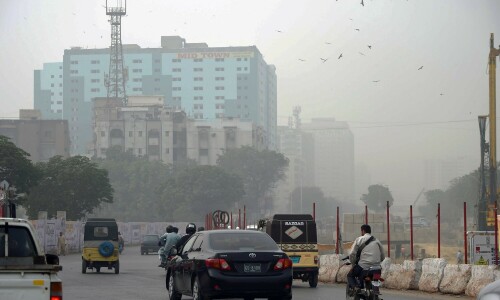AS if all of Pakistan’s other troubles were not enough, the country has now been named the second most polluted in the world — trailing only behind Bangladesh — in the 2023 World Air Quality Report published by IQAir. We are smack-dab in the middle of a huge environmental crisis. Pakistan has average PM2.5 concentrations at 73.7 micrograms per cubic metre (µg/m³) — a staggering 14 times higher than the World Health Organisation’s guideline of no more than 5 µg/m³.
It is critical to comprehend the gravity of these statistics. PM2.5, or particulate matter 2.5, refers to tiny particles or droplets in the air that are two and a half microns or less in width. These particles are so small that they can penetrate deep into the lungs and even enter the bloodstream, causing severe health issues, including respiratory infections, heart disease, and strokes.
Moreover, it makes other non-communicable diseases such as mental health issues, diabetes and infertility more likely, besides affecting the cognitive development of children. The fact that all Pakistani cities included in the study had PM2.5 concentrations at least six times above the WHO’s recommended levels is a glaring indictment of the country’s air quality and demands immediate intervention at the highest levels.
The causes of such severe air pollution are manifold, with agriculture practices, industrial emissions, vehicular pollution, and geographical and climate conditions playing significant roles. Specifically, winter temperature inversions in Punjab, combined with emissions from crop burning and industry, as well as activity from brick kilns, have created a smoggy, health-damaging environment.
Despite measures such as banning crop burning and initiating public transportation projects, the air quality continues to deteriorate, signalling that current efforts are not enough. And time — quite literally — is running out. Based on data from the Pakistan Air Quality Initiative, hazardous air quality is shaving off an estimated 4.4 years from the life expectancy of Pakistan’s inhabitants.
The new government needs to rise to the occasion and take bold steps. It must urgently overhaul environmental regulations, aggressively invest in renewables, and champion public transportation. It is not just regulations that are needed: enforcement is paramount. There is an urgent need to enhance the capacity for monitoring and managing air quality. Public awareness campaigns are crucial to educate citizens about the sources of pollution and the steps they can take to reduce their personal contributions to air quality degradation. Vehicles must undergo mandated smoke checks, as is done in developed countries. Moreover, collaboration with neighbouring countries is essential, given the transboundary nature of air pollution.
We face a stark choice: enact decisive, immediate measures or suffer irreversible damage to our health and environment. Pakistanis’ life expectancy isn’t stellar as it is; it needn’t be cut any shorter.
Published in Dawn, March 25th, 2024














































Dear visitor, the comments section is undergoing an overhaul and will return soon.